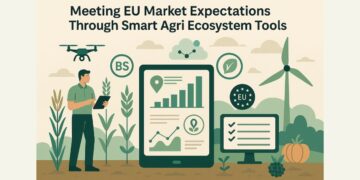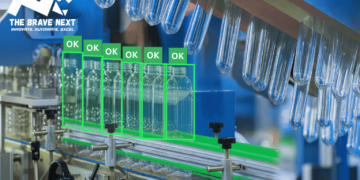As global markets evolve, the agricultural sector is under increasing pressure to align with sustainability, transparency, and compliance mandates. For Agritech companies in India, the European Union (EU) presents a lucrative yet highly regulated market. With the introduction of stringent policies like the EU Deforestation Regulation (EUDR) and growing demand for Environmental, Social, and Governance (ESG) accountability, smart agri ecosystem tools are no longer optional—they’re essential.
These intelligent solutions are transforming agriculture by offering comprehensive digital infrastructures that support compliance, reporting, traceability, and operational efficiency across the value chain.
Understanding the EU Market Landscape for Agriculture
The EU is committed to achieving climate neutrality by 2050 and is rolling out rigorous environmental standards to support this goal. Regulations such as the EUDR aim to curb global deforestation and require importers to prove that their supply chains are free from products linked to forest degradation. Additionally, ESG disclosures are becoming mandatory, even for non-European entities doing business within EU jurisdictions.
This scenario creates a dual challenge for exporters: maintaining production efficiency while adhering to increasingly complex compliance expectations.
What Are Smart Agri Ecosystem Tools?
Smart agri ecosystem tools are a combination of hardware and software technologies designed to digitize and optimize agricultural activities. These systems often include:
- IoT-based sensors for real-time monitoring of soil, weather, and crop conditions
- AI-powered analytics for yield prediction and risk assessment
- Blockchain or cloud-based platforms for traceability and data storage
- Integration tools that enable ESG and EUDR reporting
Unlike standalone farm management software, smart ecosystem tools connect various stakeholders—from farmers to exporters to compliance officers—under one digital umbrella, offering end-to-end visibility.
Benefits of Smart Agri Ecosystem Tools in Meeting EU Expectations
1. Traceability and Transparency
One of the biggest EU demands is product traceability. Consumers and regulators alike want to know the origin of food, the conditions under which it was grown, and its environmental impact. Smart agri tools provide:
- Digital records of seed origin, fertilizer use, and harvest cycles
- GPS and satellite mapping of farm plots
- Blockchain-enabled logs for unalterable transaction histories
This helps exporters demonstrate clean, traceable supply chains, thus meeting EUDR and other regulatory criteria.
2. Compliance and Reporting Automation
Manually compiling compliance reports is time-consuming and error-prone. Tools equipped with Eudr Compliance Software features can automate data collection and documentation, ensuring timely and accurate submissions. Similarly, smart platforms integrated with ESG reporting software modules can simplify the generation of impact reports required for EU stakeholders.
These capabilities are critical for exporters seeking to retain market access and improve brand credibility.
3. Risk Mitigation and Forecasting
Smart tools use AI and machine learning to analyze historical and real-time data, offering predictive insights. These can:
- Warn of adverse weather conditions or pest outbreaks
- Suggest optimal planting schedules
- Predict yield outcomes for better supply planning
Such forecasts can help agri-businesses maintain consistent supply to EU partners, avoiding disruptions and potential regulatory penalties.
How Agritech Companies in India Are Leading the Way
India is rapidly becoming a hub for innovation in agricultural technology. Agritech companies in India are developing scalable, cost-effective, and user-friendly ecosystem tools tailored for smallholder farmers and large exporters alike. Features typically offered include:
- Multilingual mobile apps for farmer engagement
- Integration with government and private certification bodies
- Digital payment systems for fair and transparent transactions
These companies are also leveraging global partnerships to align their platforms with international regulatory frameworks, making it easier for Indian agri-exporters to enter and sustain presence in the EU market.
Case Study: Smart Ecosystem in Action
Consider a coffee exporter in Karnataka aiming to access the European market. By implementing a smart agri ecosystem:
- Farmers log their cultivation practices via mobile apps
- IoT sensors monitor crop health and soil moisture
- Satellite imaging verifies land use and deforestation-free practices
- The exporter uses compliance software to automatically generate EUDR documentation
- ESG impact reports are shared with European buyers through the platform’s dashboard
As a result, the exporter meets EU requirements efficiently while improving sustainability across operations.
Challenges and Considerations
While the advantages are clear, adoption is not without challenges:
- Infrastructure Gaps: Rural areas may lack the internet bandwidth or device access needed to run smart tools efficiently.
- Data Literacy: Farmers and field workers require training to input and interpret digital data correctly.
- Interoperability: Tools must be compatible with international platforms and reporting frameworks to maximize utility.
Agritech developers must therefore prioritize ease-of-use, offline functionality, and localized training modules.
The Road Ahead: From Compliance to Competitive Edge
Smart agri ecosystem tools are no longer just a means to achieve compliance—they’re fast becoming strategic assets. Businesses that embrace digital transformation in agriculture will not only align with EU mandates but also unlock new market opportunities, enhance productivity, and build resilient supply chains.
By investing in intelligent platforms that support traceability, regulatory reporting, and sustainability goals, exporters can stay ahead of the curve. Moreover, as EU standards continue to evolve, agile digital ecosystems will enable faster adaptation and sustained growth.
Conclusion
The future of global agri-trade lies in transparency, efficiency, and sustainability. For exporters eyeing the EU market, the integration of smart agri ecosystem tools is the key to navigating a landscape shaped by stringent regulations and high consumer expectations.
From Eudr Compliance Software to ESG reporting software, the technological foundation is already in place. It’s now up to agri-businesses and Agritech companies in India to seize the moment, drive innovation, and redefine the standards for global agricultural excellence.























